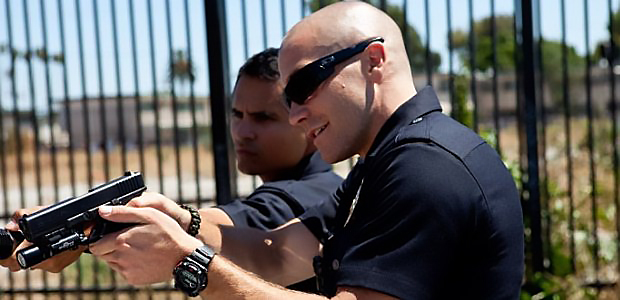End Of Watch begins like an episode on TV’s Cops. With a dashboard mounted camera, we get a first-person perspective of how it feels to be driving through alleyways in a police car. As part of a film school project, LAPD Officer Brian Taylor (Jake Gyllenhaal) captures a chase sequence while elaborating a police officer’s code on what it means to serve and protect “the prey from the predators”. In the driver’s seat, his partner Mike Zavala (Michael Peña) keeps up with the pursuit until the chase ends in an exchange of gunfire. At first glance, this opening sequence has the type of familiarity that comes from gung-ho ‘buddy-cop’ movies like Bad Boys or Lethal Weapon and its sequels. Before you know it, the second and third acts draw you deeper into an incredible story of brotherhood that is as touching as its unflinching narrative on fighting the good fight.
The setup has uniformed LAPD officers Taylor and Zavala doing the rounds, and at times responding to 911 calls via a dispatch radio frequency. Their job takes them through various locations in South Central Los Angeles while patrolling the streets – the modern policing term for ‘walking the beat’. They are good at what they do and they know it. But given the hierarchy of the police force, the fact remains that they are out-ranked by detectives, let alone higher ranking federal agents. Deemed overzealous by colleagues and commanding officers, Taylor and Zavala follow a hunch and discover the presence of a Mexican drug cartel in Los Angeles. As long term partners, they are quick to learn that this case is way bigger than their combined pay grades. What they don’t know is how dangerously close they are to being assassinated by the cartel.
Having conceived titles like Training Day and Dark Blue, Writer-director David Ayer is a creative genius with an affinity for solid police dramas set within Los Angeles, but perfectly suited with a buddy-cop premise. Besides the well written and original screenplay, what works here is the bromantic chemistry between Gyllenhaal and Peña. As the film progresses, we come to appreciate how different they are ethnically but how united they are as partners upholding the law. Individualistically, they have different ideas from dating to starting a family. In expressing these beliefs, albeit on patrol, Ayer lightens the story from its increasingly dark tone. One particular scene right before the end credits has Zavala recount a hilarious traumatic event while dating his girlfriend when they were teenagers – priceless! Then we are introduced to the women in their lives; Natalie Martinez as Zavala’s wife Gabby, and Anna Kendrick as Taylor’s new girlfriend Janet. Adding romantic ties to active duty cops induces an element of impending doom, but this is where Ayer has Taylor and Zavala charm the audience to a point of no return. We start to like them with or without the badge and gun; we laugh at their racial squabbling; we approve their methods of fighting crime; but by the time we get to the end of the movie, we feel the evil closing around them and hope that they survive till the end.
Aside from some questionable camera angles meant to look like found footage, End Of Watch is in a distinguished class of its own. It is the type of rough and tough cop-thriller that isn’t afraid to say that behind the badge and Kevlar is a living, breathing human being. This is where Ayer’s story hits an emotional but very real note in commending the lives of those who bravely choose to protect their fellowmen. Besides charismatic performances from Gyllenhaal and Peña, I highly recommend this film for its modest take on urban crime fighting, and in its entirety – the best cop film I’ve seen in years.
Rating: 




